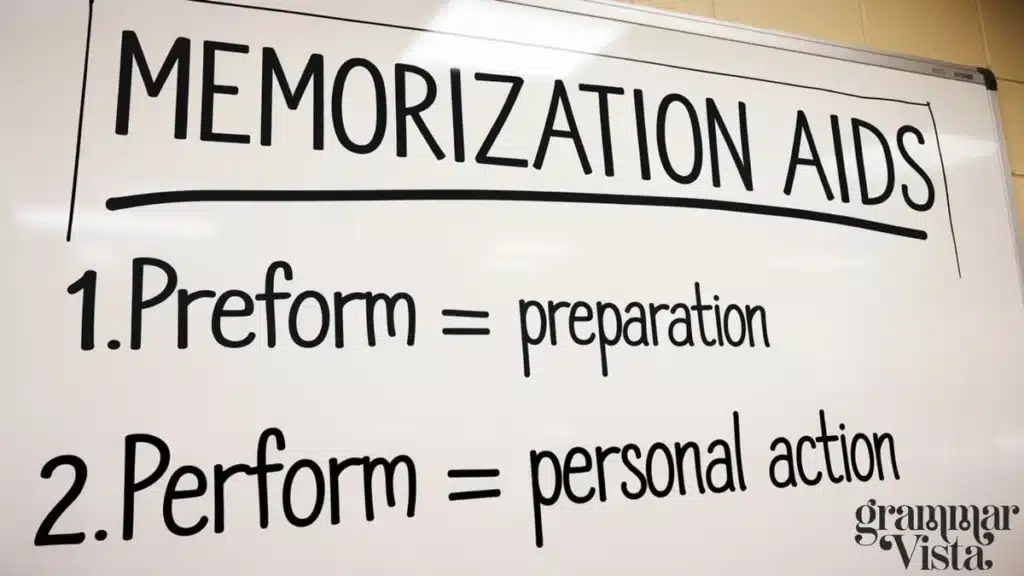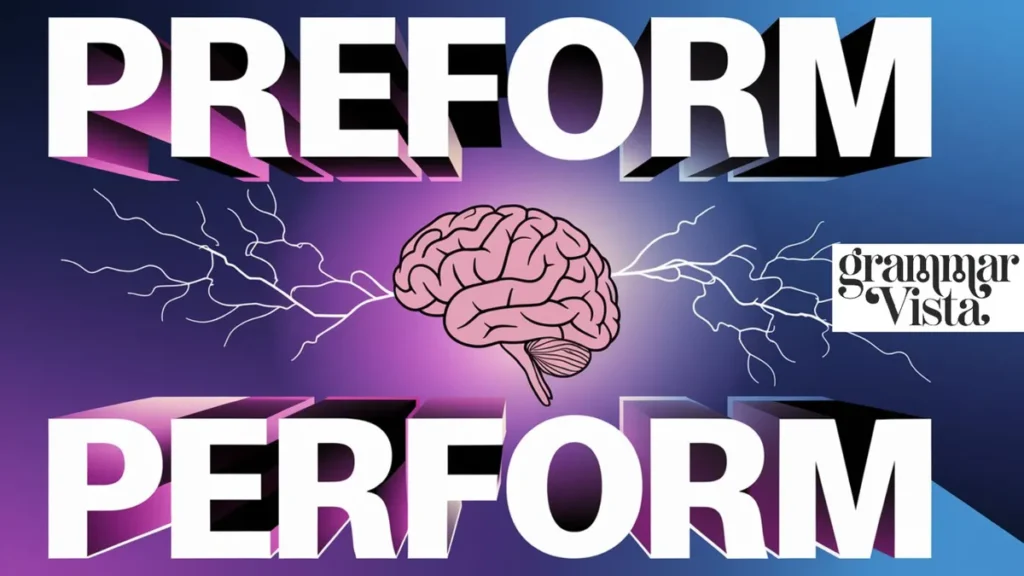Have you ever found yourself staring at your screen, finger hovering over the send button, wondering if you’ve used the right word in that important email? You’re not alone. The English language is full of tricky pairs that can trip up even the most seasoned writers. Today, we’re diving into one such pair: preform vs. perform.
If you are want to unfold this confusion, don’t leave and keep reading till the last word of last line in this article!
The Common Confusion
It’s a frequent mistake that many people make. These two words sound identical when spoken, making them homophones. But don’t let their similar pronunciation fool you – they’re as different as night and day in meaning and usage. Let’s unravel this linguistic knot and ensure you never mix them up again.
Understanding the Difference
Grasping the distinction between preform and perform is crucial for clear communication. One little letter can make a world of difference, changing the meaning of your entire sentence. So, let’s break it down.
Preform: Shaping the Future

Preform is a noun or a verb related to shaping or forming something before its final stage. Think of it as the “pre-game” of manufacturing or creation.
As a noun, a preform is a partially finished product that requires further processing to become the final item. For example, in the bottling industry, a preform is a test-tube shaped piece of plastic that will eventually be blown into a full-sized bottle.
As a verb, to preform means to shape or form beforehand. It’s about preparation and setting the stage for what’s to come.
Perform: Action in Motion

Perform, on the other hand, is all about action. It’s a verb that means to carry out, accomplish, or fulfill an action, function, or role.
When you perform, you’re doing something – whether it’s singing on stage, completing a task at work, or even how well your car runs. It’s about execution and bringing something to life.
Distinct Meanings in Action
Let’s see these words in action to really hammer home their unique definitions:
- The factory uses a machine to preform the plastic before it’s molded into the final product.
- Sarah will perform her new song at the concert tonight.
In the first sentence, “preform” refers to the initial shaping of the plastic. In the second, “perform” is about Sarah taking action and singing on stage.
Scenarios That Showcase the Difference

Writing an Important Email
Imagine you’re composing a message to your boss about a project:
Incorrect: “I’ve preformed all the tasks you assigned.” Correct: “I’ve performed all the tasks you assigned.”
Using “preform” here would imply you shaped the tasks beforehand, which doesn’t make sense in this context. You want to convey that you’ve carried out or completed the tasks, so “perform” is the right choice.
In Manufacturing
Now, picture yourself as a factory manager:
Correct: “We need to preform the metal sheets before welding them together.” Incorrect: “We need to perform the metal sheets before welding them together.”
Here, “preform” is correct because you’re talking about shaping the metal sheets in preparation for the welding process.
Why It’s Essential to Grasp
Whether you’re a student or professional, understanding the difference between preform and perform is crucial. It’s not just about spelling – it’s about crafting clear, precise communication.
Seasoned writers know that choosing the right word can make or break your message. In professional settings, using the wrong term could lead to misunderstandings or even costly mistakes. In academic writing, it could mean the difference between a top grade and a disappointing mark.
Read More about Business’ or Business’s?
Commonly Used Contexts
Let’s explore some fields where you might encounter these terms:
- Manufacturing: “Preform” is frequently applied in industries like plastics, metals, and composites.
- Performance Arts: “Perform” is the star of the show in theater, music, and dance.
- Business: Both words have their place. You might “preform” a strategy before you “perform” it in the market.
- Technology: In software development, you might “preform” data before you “perform” analysis on it.
Memory Tricks to Keep Them Straight

Struggling to remember which is which? Here are some memorization aids to help you out:
- PREform = PREparation: Both start with “pre,” reminding you that preform is about preparing or shaping beforehand.
- PERform = PERsonal action: The “per” in perform can remind you of “person,” as in someone taking action.
- Think of “E” for “Early” in prEform, and “O” for “Ongoing” in perfOrm.
The Impact of Misuse
Using the wrong word doesn’t just make your writing less polished – it can completely alter your meaning. Let’s look at an extreme example:
“The surgeon will preform the operation at 2 PM.”
This sentence suggests the surgeon will shape or mold something before the operation, which is clearly not the intended meaning. The correct sentence would be:
“The surgeon will perform the operation at 2 PM.”
This correctly conveys that the surgeon will carry out the operation.
You might be interested in 30 Ways to Say “Have a Good Day” Professionally
More Ways to Distinguish Preform and Perform
The Etymology Game
Understanding the origins of words can be a powerful tool for grasping their distinction. Let’s break these words down:
- Preform: Comes from the prefix “pre-” (meaning before) and “form” (to shape or mold).
- Perform: Derives from Old French “parfornir,” meaning “to do, carry out, finish, accomplish.”
This etymological insight gives us a clearer picture: preform is about shaping beforehand, while perform is about carrying out or accomplishing.
Industry-Specific Uses
Let’s explore how these terms are commonly used in various fields:
1. Dental Industry
In dentistry, a “preform” is a pre-shaped dental crown or filling material. Dentists don’t “perform” a crown; they “preform” it and then fit it to the patient’s tooth.
2. Textile Manufacturing
Textile manufacturers might “preform” fibers into a specific shape before weaving them into fabric. They then “perform” quality checks on the finished product.
3. Software Development
Developers might “preform” data by cleaning and structuring it before they “perform” analysis or feed it into an algorithm.
The Noun vs. Verb Dilemma
Here’s another key difference:
- “Preform” can be both a noun and a verb.
- “Perform” is primarily used as a verb.
For example:
- “The preform (noun) is ready for the next stage of production.”
- “We need to preform (verb) the plastic before molding.”
- “She will perform (verb) at the concert tonight.”
Contextual Clues
Understanding the difference often comes down to context. Here are some phrases that might indicate which word to use:
Preform:
- “Shape beforehand”
- “Preliminary form”
- “Before final production”
Perform:
- “Carry out”
- “Execute”
- “Put on a show”
The Impact on Meaning
Let’s look at how these words can drastically change the meaning of a sentence:
- “The team will preform the strategy.” (Incorrect) This suggests the team will shape the strategy beforehand, which doesn’t make sense.
- “The team will perform the strategy.” (Correct) This correctly indicates that the team will carry out or execute the strategy.
For Students and Professionals
Whether you’re a student or professional, mastering these distinctions can significantly impact your writing and communication. Here’s why it matters in different contexts:
Academic Writing
Using “preform” when you mean “perform” in a research paper could confuse your readers and potentially lower your grade.
Business Communications
In a project proposal, mixing up these terms could lead to misunderstandings about project phases and deliverables.
Technical Documentation
In fields like engineering or manufacturing, precision is key. Using the wrong term could lead to costly errors in production.
Memory Tricks Expanded
Let’s add to our list of memorization aids:
- PreFORM is about FORM-ing something before its final stage.
- PerFORM is about FORM-ing an action or task thoroughly (per- can mean “thoroughly” in Latin).
- Think of “preform” as the cocoon and “perform” as the butterfly’s flight.
The Role of Context
Context is king when it comes to choosing between preform and perform. Consider these sentences:
- “The scientist will preform the experiment tomorrow.”
- “The scientist will perform the experiment tomorrow.”
Sentence 1 suggests the scientist will shape or mold the experiment beforehand, which is unlikely. Sentence 2 correctly indicates the scientist will carry out the experiment.
In the World of Art and Performance
In the realm of performing arts, the distinction becomes even more crucial:
- An artist might preform a sculpture out of clay before firing it in a kiln.
- The same artist would then perform at the sculpture’s unveiling ceremony.
Read More grammar lessons on GrammarVista
A Word to the Wise
For seasoned writers and newcomers alike, here’s a golden rule: When in doubt, look it up. It’s always better to take a moment to verify than to use the wrong word and potentially confuse your audience.
The Bigger Picture

Remember, mastering these nuances isn’t just about impressing your English teacher or boss. It’s about becoming a more effective communicator. Clear, precise language helps you convey your ideas more powerfully, whether you’re writing an important email, crafting a compelling story, or explaining a complex concept.
Conclusion
As we’ve seen, the difference between preform and perform is significant. One is about shaping and preparation, the other about action and execution. By understanding and correctly using these terms, you’ll elevate your writing and communication skills.
Remember, language is a tool for clarity. By choosing the right words, you’re not just showing off your vocabulary – you’re ensuring your message is understood exactly as you intend it.
So, the next time you’re writing an important email or crafting a crucial report, take a moment to consider: Are you talking about shaping something beforehand (preform), or carrying out an action (perform)? This small act of reflection can make a big difference in how effectively you communicate.
Whether you’re a budding writer or a seasoned professional, mastering these nuances of language will serve you well. It’s these small details that often separate good writing from great writing.
So, go forth and use your newfound knowledge. Preform your ideas, then perform them with confidence. Your writing will thank you for it!







